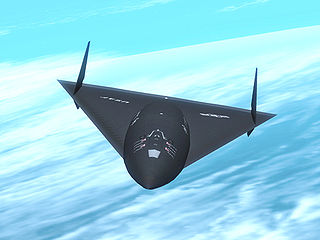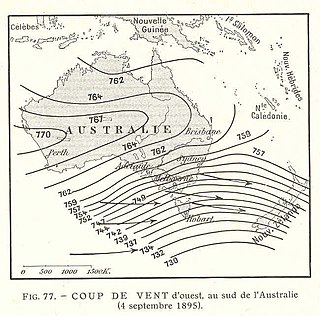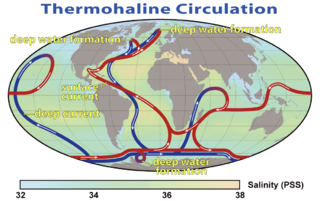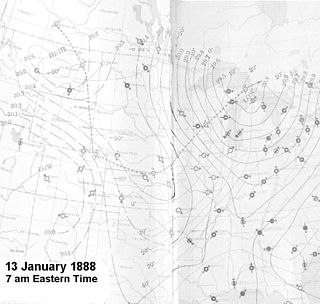Related Research Articles

A blizzard is a severe snowstorm characterized by strong sustained winds and low visibility, lasting for a prolonged period of time—typically at least three or four hours. A ground blizzard is a weather condition where snow is not falling but loose snow on the ground is lifted and blown by strong winds. Blizzards can have an immense size and usually stretch to hundreds or thousands of kilometres.

Lake-effect snow is produced during cooler atmospheric conditions when a cold air mass moves across long expanses of warmer lake water. The lower layer of air, heated by the lake water, picks up water vapor from the lake and rises through colder air. The vapor then freezes and is deposited on the leeward (downwind) shores.

Aurora is a rumored mid-1980s American reconnaissance aircraft. There is no substantial evidence that it was ever built or flown and it has been termed a myth.
Ocean thermal energy conversion (OTEC) is a renewable energy technology that harnesses the temperature difference between the warm surface waters of the ocean and the cold depths to produce electricity. It is a unique form of clean energy generation that has the potential to provide a consistent and sustainable source of power. Although it has challenges to overcome, OTEC has the potential to provide a consistent and sustainable source of clean energy, particularly in tropical regions with access to deep ocean water.

An icicle is a spike of ice formed when water falling from an object freezes.

The Roaring Forties are strong westerly winds that occur in the Southern Hemisphere, generally between the latitudes of 40° and 50° south. The strong eastward air currents are caused by the combination of air being displaced from the Equator towards the South Pole, Earth's rotation, and the scarcity of landmasses to serve as windbreaks at those latitudes.

Thermohaline circulation (THC) is a part of the large-scale ocean circulation that is driven by global density gradients created by surface heat and freshwater fluxes. The adjective thermohaline derives from thermo- referring to temperature and -haline referring to salt content, factors which together determine the density of sea water. Wind-driven surface currents travel polewards from the equatorial Atlantic Ocean, cooling en route, and eventually sinking at high latitudes. This dense water then flows into the ocean basins. While the bulk of it upwells in the Southern Ocean, the oldest waters upwell in the North Pacific. Extensive mixing therefore takes place between the ocean basins, reducing differences between them and making the Earth's oceans a global system. The water in these circuits transport both energy and mass around the globe. As such, the state of the circulation has a large impact on the climate of the Earth.

Chinook winds, or simply Chinooks, are two types of prevailing warm, generally westerly winds in western North America: Coastal Chinooks and interior Chinooks. The coastal Chinooks are persistent seasonal, wet, southwesterly winds blowing in from the ocean. The interior Chinooks are occasional warm, dry föhn winds blowing down the eastern sides of interior mountain ranges. The coastal Chinooks were the original term, used along the northwest coast, and the term in the interior of North America is later and derives from the coastal term.

John Luther Adams is an American composer whose music is inspired by nature, especially the landscapes of Alaska, where he lived from 1978 to 2014. His orchestral work Become Ocean was awarded the 2014 Pulitzer Prize for Music.

The Schoolhouse Blizzard, also known as the Schoolchildren's Blizzard, School Children's Blizzard, or Children's Blizzard, hit the U.S. Great Plains on January 12, 1888. With an estimated 235 deaths, it is the world's 10th deadliest winter storm on record.

A quinzhee or quinzee is a Canadian snow shelter made from a large pile of loose snow that is shaped, then hollowed. This is in contrast to an igloo, which is built up from blocks of hard snow, and a snow cave, constructed by digging into the snow. The word is of Athabaskan origin and entered the English language by 1984. A quinzhee can be made for winter camping and survival purposes, or for fun.

The winter of 1962–1963, known as the Big Freeze of 1963, was one of the coldest winters on record in the United Kingdom. Temperatures plummeted and lakes and rivers began to freeze over.

Emily Windsnap is a series of children's fantasy novels written by British author Liz Kessler, inaugurated by The Tail of Emily Windsnap in 2003 and continuing as of 2020. It is illustrated primarily by Sarah Gibb and published by Orion Children's Books in Britain, and Candlewick Press in America. The series originated as a poem that Kessler was writing about a "little girl who lived on a boat but had a big secret"; an editor recommended that Kessler turn the poem into a book.

A sea is a large body of salty water. There are particular seas and the sea. The sea commonly refers to the ocean, the wider body of seawater. Particular seas are either marginal seas, second-order sections of the oceanic sea, or certain large, nearly landlocked bodies of water.

The ocean is a body of salt water that covers approximately 70.8% of the Earth and contains 97% of Earth's water. The term ocean also refers to any of the large bodies of water into which the world ocean is conventionally divided. Distinct names are used to identify five different areas of the ocean: Pacific, Atlantic, Indian, Antarctic/Southern, and Arctic. Seawater covers approximately 361,000,000 km2 (139,000,000 sq mi) of the planet. The ocean is the primary component of the Earth's hydrosphere, and thus essential to life on Earth. The ocean influences climate and weather patterns, the carbon cycle, and the water cycle by acting as a huge heat reservoir.

The Arctic Ocean is the smallest and shallowest of the world's five major oceans. It spans an area of approximately 14,060,000 km2 (5,430,000 sq mi) and is known as one of the coldest of oceans. The International Hydrographic Organization (IHO) recognizes it as an ocean, although some oceanographers call it the Arctic Mediterranean Sea. It has also been described as an estuary of the Atlantic Ocean. It is also seen as the northernmost part of the all-encompassing World Ocean.
Lego Atlantis was a product range of the construction toy Lego, themed around the underwater world of Atlantis. The range was launched in early 2010 and discontinued by the end of 2011. The toy sets included models of buildable underwater vehicles, as well as "heroic diver" and "shark warrior" minifigures. A ride based on the range was operated at Legoland Windsor Resort.

Steve Sheinkin is an American author of suspenseful history books for young adults. A former textbook writer, Sheinkin began writing full-time nonfiction books for young readers in 2008. His work has been praised for making historical information more accessible.

Olaf's Frozen Adventure is a 2017 American animated featurette produced by Walt Disney Animation Studios and directed by Kevin Deters and Stevie Wermers. The screenplay was written by Jac Schaeffer, with Josh Gad, Kristen Bell, Idina Menzel, and Jonathan Groff reprising their roles from Frozen (2013).

Sven is a fictional character in the animated feature film Frozen (2013) and its sequel Frozen II (2019), produced by Walt Disney Animation Studios. He is a reindeer that lives together with his companion, Kristoff. Sven, alongside Kristoff, assists princess Anna in her search for her sister, queen Elsa, who has run away after placing the kingdom of Arendelle under an eternal winter. During their adventure, Sven also meets and befriends a living snowman, Olaf. Years after the events from the first film, Sven and the others go in search of a mysterious voice heard by Elsa. In the course of the journey, Sven meets other reindeer. Besides the two films, Sven is also present in the short film Frozen Fever (2015) and the featurette Olaf's Frozen Adventure (2017).
References
- 1 2 Mary Roche (23 July 2009). "Less Than Zero". The New York Times . Retrieved 4 January 2020.
Book Review: Cold: Adventures in the World's Frozen Places, by Bill Streever
- 1 2 Stephen Harrigan (3 January 2020). ""In Oceans Deep" and "Into the Planet" Review: No Strangers to the Abyss". The Wall Street Journal . Retrieved 4 January 2020.
- ↑ "'Roaring Wind' Examines Extreme Weather, And The Power Of Air". NPR . 16 August 2019. Retrieved 4 January 2020.
Biologist Bill Streever sailed from Texas to Guatemala while doing research for his new book, And Soon I Heard a Roaring Wind. He says the wind was working against him "most of the time."
- ↑ "Bill Streever". Hachette Book Group. 2017-06-28. Retrieved 2023-07-13.